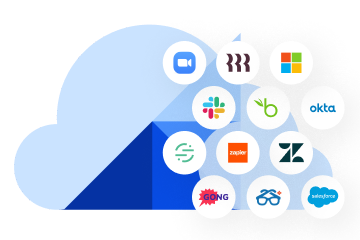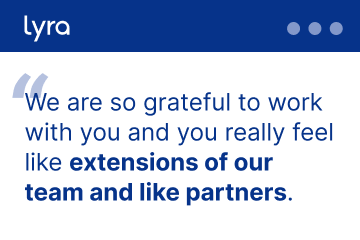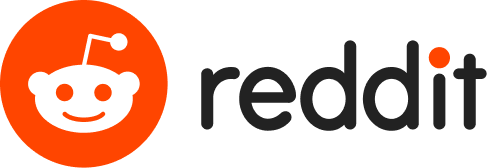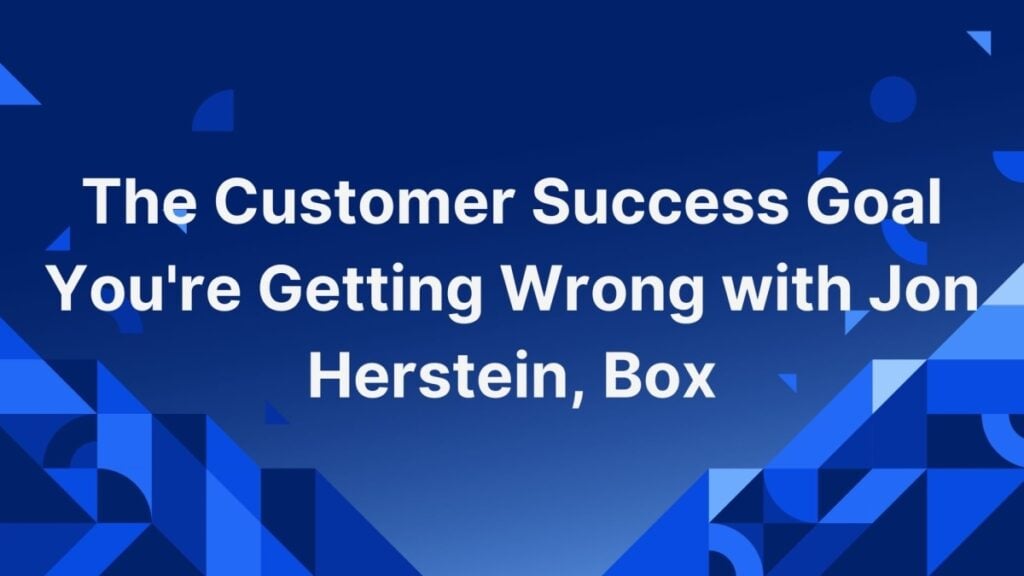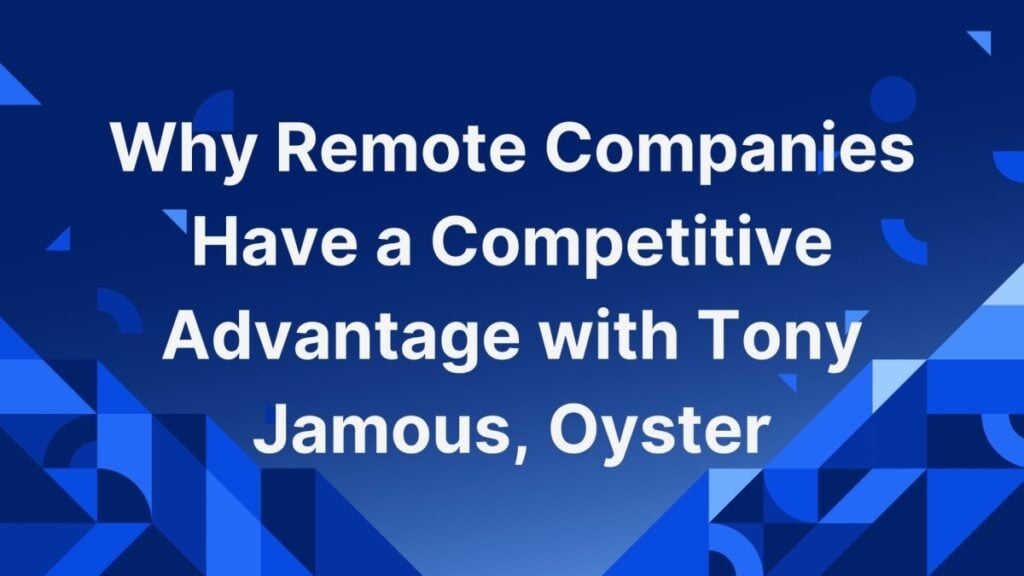-
 Resource Center
Resource Center
Discover enablement best practices and more in our resource center.
-
 Blog
Blog
Read the latest on enablement, learning and training trends.
-
 Podcast
Podcast
LEARN from the top leaders in SaaS.
-
 Videos
Videos
Watch videos and gain actionable insights from leading experts.
Be the Driver of Your Career: Insights From Marta Pinilla, CPO, Airtable
Everyone wants to feel seen and understood at work, especially when it comes to advancing their careers.
However, in fast-paced, lean teams, career development can take a backseat.
Join us in the latest episode of LEARN, where Marta Pinilla, CPO at Airtable, dives into the crucial role of leadership in fostering career growth, her philosophy on People teams in today's dynamic environment, and the power each individual holds in creating their own career roadmap.
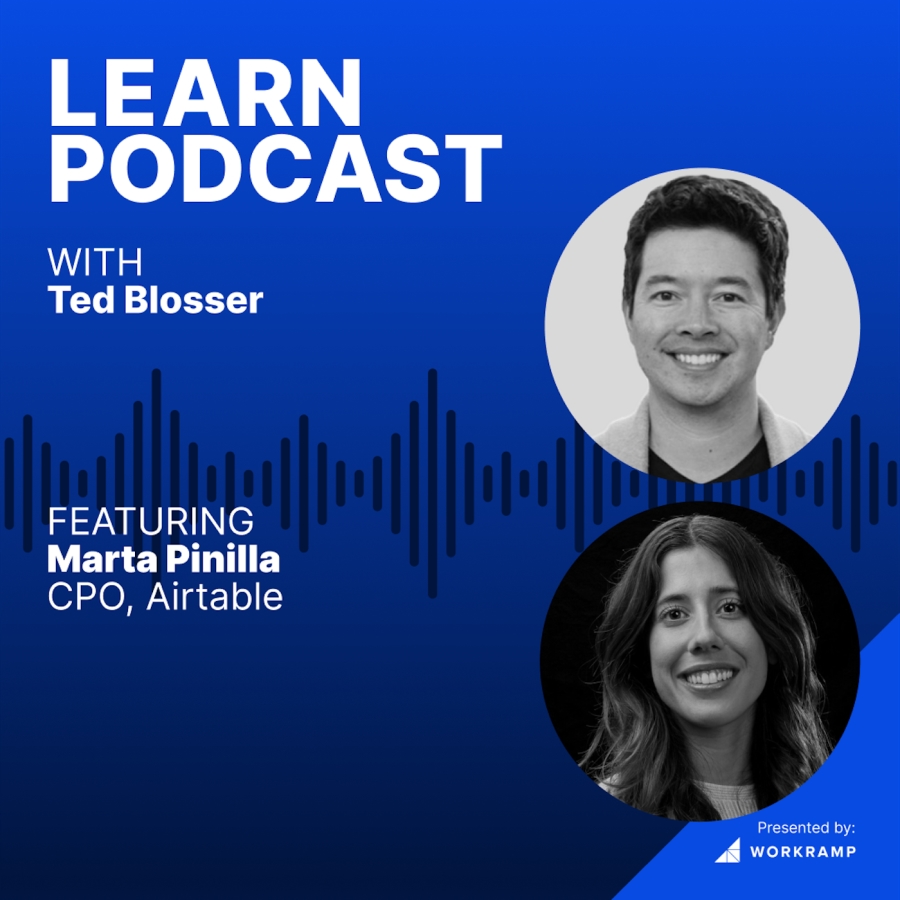
“It's easy for an employee to expect the company to deliver the next step, and certainly, the company has a responsibility to play. But I like this concept that we're on a road trip, and you, as the employee, are in the driver's seat, and I'm your co-pilot. I'm right there with you. I have a map. I have a few options like, "Hey, maybe we go here or here. You can take this route or that route. But you're driving. I'm not driving." And it should always be that dynamic. Again, that just puts the right mindset around your development.”
Tune in to this episode to gain insights on:
- Marta's framework for recruiting and recognizing top-tier talent
- The importance of curiosity and how individuals drive their career plans
- Understanding the People function as an extension of the CEO's role
- Leveraging the power of AI for HR teams
Don't miss out on this empowering conversation! Listen now.
Timestamps
01:40 - Intro to Marta & about Airtable
03:36 - Career background
09:45 - Career development
16:38 - Recruiting for a high-growth company
19:23 - Recruiting best practices & tips
23:14 - Investing in recruiting & scaling
27:05 - AI & People teams
29:45 - Rapid-fire round
Resources
Podcast:
Transcript
Marta Pinilla: It's easy for an employee to expect the company to deliver the next step, and the company has a responsibility to play. But I like this concept that we're on a road trip, and you, as the employee, are in the driver's seat, and I'm your co-pilot. I'm right there with you. I have a map. I have a few options like, "Hey, maybe we go here or here. You can take this route or that route. But you're driving. I'm not driving." And it should always be that dynamic. Again, that puts the right mindset around your development.
Ted Blosser: Hi, I'm Ted Blosser, CEO and co-founder of WorkRamp, where we're redefining the corporate learning space with the world's first all-in-one learning cloud for employee and customer learning. Welcome to the LEARN podcast, where we learn from the biggest leaders in SaaS and hear what makes them successful. Hope you enjoy the show. We're excited to have our guest, Marta Pinilla Aguilar, the Chief People Officer, at Airtable, with us today. Welcome to the show, Marta.
Marta Pinilla: Thank you, Ted, and it's great to reconnect.
Ted Blosser: For some background. Marta and I actually go way back. We actually met at Box back in 2011. You were in recruiting coordination at that time.
Marta Pinilla: Yep.
Ted Blosser: So today, we're going to do a really fun journey mapping. We're actually going to go through Marta's career journey. She's had some exciting experiences at Box and then migrated to Airtable. And so, one of the best careers I've seen from recruiting into now is the CPO role at Airtable. Before we jump into that, Marta, please tell us a little about your current role. Tell us a little more about Airtable. Most people know it, but they need to tell us about the role and Airtable as a company.
Marta Pinilla: Absolutely. So starting with Airtable. Our product empowers any team, regardless of technical skill, to design applications that power critical workflows and make their valuable data useful to them in the day-to-day. And, of course, this shows up in many different ways, depending on the company and the team. But one fun example is Equinox. You know, the Global Gym Club. All the digital content members interact with on the mobile app is powered by Airtable.
And they built their entire production pipeline on Airtable. And they're able to publish content about 400% faster than they were before. So it's just one example, right. But overall, we have about 450,000 organizations that use Airtable, including 80% of the Fortune 100, and that's product. And so far as the organization goes, we're under 1000 employees. We celebrated our 10th birthday in February.
Ted Blosser: Wow.
Marta Pinilla: Yeah. And we're a hybrid environment, so we have remote folks and offices in the Bay Area, Austin, London, LA, and New York.
Ted Blosser: So you're saying Airtable can keep you fitter if you work?
Marta Pinilla: I think so.
Ted Blosser: Workout at Equinox. So can do everything, which is great.
Marta Pinilla: It can do it all.
Ted Blosser: I need maybe introduce Equinox into my workout... I mean Airtable into my workout routine. It will keep me more fit.
Marta Pinilla: Totally.
Ted Blosser: Let's start off with your career at Box. When we met in 2011, you started as an individual contributor recruiter. Tell us about those years. What did you learn? How were they?
Marta Pinilla: Yeah.
Ted Blosser: Tell us about those early years.
Marta Pinilla: Well, I'm sure you remember those years at Box. It was a period of hypergrowth. I joined when the company was around 200 people. When I left seven years later, it was about 2000. So many stories from that period, but in those early years, it was particularly high growth. We went from 200 to 700 in a couple of years, and I was one of two people on a team that did all recruiting for essentially non-sales and non-engineering roles. So that's everything else, design, product, post-sales, GNA, and it was bonkers.
We had 50 rolls open at any time per recruiter and 14 phone screens a day talking to candidates. And I think, on a surface level, it taught me a lot about the value of hard work and time management and seeing the fruits of your labor. But I think on a deeper level, the takeaway that I had that continues to serve me to this day is in a startup environment or really any high growth environment, there's going to be 20 things on fire or more, probably more. You will not get to all of them, right.
It could have been better. Things fell through the cracks. But it taught me how to determine the top three to five fires and what moved the needle. And that kind of deep editorialization and ruthless prioritization just became part of my DNA, thanks to that experience. Now, would I want to do that again? Probably not. It was a time and a place for that kind of craziness, but it was really valuable, and I learned a lot.
Ted Blosser: When you reflect on those early years, was there a skill you developed? Was it the sales skills? Was it time management skills? What was the number one skill you felt you developed in the early days?
Marta Pinilla: I would highlight a couple. One is around prioritization. Again, this kind of daily, weekly, monthly reflection on, "At the end of the day, what do I need to say I've accomplished? What is truly moving the needle for the business, and how do I know that? And knowing from the get-go how I'm going to measure success." That is probably number one, and again, it continues to serve me to this day. The second was around business partnership, which is inherent in recruiting or other internal-facing roles where your customer is the leader you're working with.
But it's valuable in any role because I worked with diverse hiring managers or leaders. What a controller cares about differs from what a head of customer success cares about. And so learning how to ask the right questions, really understanding what they cared about, what kept them up at night. Being curious about that lent itself well to my role today, even in building strong stakeholder relationships.
Ted Blosser: You did the individual contributor role for over three years, and you learned... I bet you... How many candidates did you close in those-
Marta Pinilla: Oh gosh.
Ted Blosser: Three and a half years.
Marta Pinilla: Probably like 100-
Ted Blosser: Like 1500.
Marta Pinilla: No, like 150
Ted Blosser: 150. That's crazy.
Think of all those careers you affected. That's so awesome.
But you go from IC into leadership and start moving up the leadership ranks over those years. You're the remainder of; it's about four years left at Box when you got promoted. And so, how was that... how would you say that jump was for you? Did you get a mentor?
Marta Pinilla: Yeah.
Ted Blosser: Was it tough? And then walk us through any big learnings jumping into basically your first... It was your first leadership role in your career, so walk us through that.
Marta Pinilla: Yeah, absolutely. So I had the gift of a mentor and manager that gave me all the fundamentals. And I think managing humans is, first and foremost, an apprenticeship in that, yes, you can read all the books, and while that is important, having individuals that can be good sounding boards along the way and that you can run practical examples by and have that thought partnership is really valuable.
So I think I had somebody at work that was that person for me, and that was huge. But I think the job was tough, and it was tough because I moved from full cycle recruiting, which is where you're talking to candidates, giving offers, et cetera, to managing a recruiting coordination team, which coordination is where... is a role in which folks schedule interviews. So it's a process-oriented position. It needs to be more client-facing. And not only that, the way that it was structured at Box, this was a team that was sort of a stepping stone into full-cycle recruiting. You started as a coordinator, and then you moved on.
And so many of the folks we hired had their sights on becoming full cycle recruiters as quickly as possible. They were bright, ambitious, and they were doing roles that, at times, were tedious and repetitive. And so it really forced me to focus on strong management fundamentals because I didn't have the headwind of an interesting role. Well, of a role that they were interested in in the long run, right?
Ted Blosser: Yep.
Marta Pinilla: And so it forced a lot of coaching and career development conversations, setting expectations effectively around time and role. And that was hard but useful. I would say, though, I then moved on from that to managing increasingly large full-cycle teams there. And I think a few of my takeaways in terms of guiding principles, I guess, I would say, are one, it might seem obvious.
But, at the end of the day, everyone wants to feel seen at work and understood. And again, management 101. But I think it's so often missed, especially in a hyper-growth environment where it's gone, go, go, simply asking questions, being curious not only for the person to feel seen but also for you to know what's going on in their world, and to be able to translate that upward is so important.
Ted Blosser: Let me double-click into the time you're managing coordinators. It's really relevant for this market, especially heads of people, is that there's this perception that, "Hey, because the market's not growing as fast as it used to, there's basically career stagnation."
Marta Pinilla: Mm-hmm.
Ted Blosser: Do you... And I could see that even back in the heyday where it's like can't probably recruit someone after two months of coordination. I am still determining what the cycle was.
Marta Pinilla: Yeah.
Ted Blosser: I'm guessing probably over nine to 12 months or something back then. But how do you battle through that perception with employees? Do you have any tips and tricks, even fast-forwarding to today's role or back then, that you learned?
Marta Pinilla: Yeah, absolutely. So there's... it's like a multi-layered cake, I guess, in that I think there's a systems and expectation-setting layer. Then there's the day-to-day coaching and connecting the dots to opportunities layer. And both are important. On the first one around, kind of what you... the system side, creating rich career frameworks is so valuable. And I know it can often be dismissed as HR speaks. And there are some career rubrics that are lots of fluff words and not that useful.
But having a leadership team think about, "What's the scope of impact and expected outcomes in this role, and what are the competencies that we want to see developed that go beyond checking a box?" That was one of the challenges we ran into at the beginning of the Box days is we had... our initial rubrics were very much... very binary, "Have you done this or have you not done this?" And that's not the point of a career, right. Most skills, most competencies are a spectrum. And you... communication as a competency.
I'm still working on communication, just as I was 10 years ago. What I'm working on is different, but that richness should be captured and the applied frameworks. And those frameworks should be socialized early when somebody joins throughout their tenure, and there should be career plans around that. From a systemic standpoint, that is important to do. From a one-on-one coaching and career development standpoint, there's so much power in the person knowing that you care and are asking about their career development goals.
Managers are often scared to have the conversation because they don't know and they don't have an answer. They don't know when the promotion opportunity's going to be. And I think what's missed in that is that oftentimes not talking about it makes the person think there's something wrong. They can assume the worst. It's a black box.
Suppose they know you care and you're asking them regularly. You're having conversations, even if there's ambiguity, as long as you make that implicit ambiguity explicit. In that case, you're on the journey together. And then the last thing I would add. I have a very silly and, well, silly... a cheesy analogy I use all the time around career development that I think is the right visual, which is, I think, at times, it's easy for an employee to expect the company to deliver the next step.
Ted Blosser: Yep.
Marta Pinilla:
And certainly, the company has a responsibility to play. But I like this concept that we're on a road trip, and you, as the employee, are in the driver's seat, and I'm your co-pilot. I'm right there with you. I have a map. I have a few options like, "Hey, maybe we go here or here. You can take this route or that route. But you're driving. I'm not driving." And it should always be that dynamic. And again, I think that puts the right mindset around career development.
Ted Blosser: That's a great analogy. We could use that internally if "Hey, you're right. You are in the driver's seat of your career. We might be in the passenger or back seat, giving you tips on where to go, right? But at the end of the day, hey, we're not going to be your employer forever. Still, during this portion of the road trip, we will ensure you have the right opportunities to grow." So that's awesome that you had that experience learning it at Box first.
Hey, everyone. I want to talk about the WorkRamp Learning Cloud we're on now with Marta from Airtable. She's a Chief people officer there. Airtable is a customer of WorkRamp. They use WorkRamp's Learning Cloud to enable their employees, empower them to upskill, and educate their partners. So if you want to learn more about Airtable's success with WorkRamp, check us out at workramp.com and get in touch, and we're happy to share more. Now back to the show. Okay. Let's transition from Box. So you do this really good run. You're one of the few people in the Valley with these nice long runs at companies, and this Airtable run will be a great one too.
But you do seven and a half years at a Box. Then you transition... You were like an icon at Box, but then you transitioned over to Airtable. Tell us about the why of that transition first and then how that transition went. Because again, that's not easy to leave a place where you probably knew... Again, you said you recruited over 150 people personally and indirectly, over a thousand, I bet, or something like that. But how was that transition over to Airtable?
Marta Pinilla: Yeah, yeah. And look, I mean, clearly I'm biased because I have spent a long time at some places, but I think that's one of the beauties of joining a high growth company if you were to ask me, "Well..." I often get the question like, "So long. Why?" It's like I felt like I had a different job every 12 months. Even if my title was the same and the scope was the same, my challenges were different. And I think this goes back to what you were asking about earlier around how we think about career progression and an environment that is changing.
And it still comes back to finding the richness and evolving challenges. But with Box, I knew... It's funny. I knew it was time when I felt this inner piece of, "Okay, I've done something I'm really proud of, and I feel like I'm graduating." I didn't feel like I was leaving a job. It felt like this kind of educational journey I had been on. I had a successor in mind. A lot of these kinds of core systems and processes that we had been really pushing to build for kind of scalable recruiting, in the long run, were built. I didn't feel like I was running away. I just felt really proud and ready to move on.
I took seven months off, and I traveled. I went to Europe for two months. I did a six-week road trip with my now husband. We didn't kill each other. So that tells me something. And I met Airtable through... actually through a Box connection. I wasn't looking, and I ended up consulting for Airtable, and this is how they get you because I was asked to develop the recruiting plan for the next 12 months. And once I did, I was like, "Well, I want to do this, so can I do this?" And yeah, the rest is history.
Ted Blosser: That's awesome. Okay. I want to break down Airtable maybe into two parts.
Marta Pinilla: Yeah.
Ted Blosser: I love to get best practices from a recruiting perspective, and you were doing a lot of it during the hyper-scale time as well too. And so love to hear about that. And then the other part, we'll shift into the people aspect of things.
Marta Pinilla: Sure. Yeah.
Ted Blosser: What you've learned so far too. That's a little bit the newer role for you.
Marta Pinilla: Yeah.
Ted Blosser: But give us your top learnings... Let's start with recruiting. Give us your top learnings on the recruiting side because now you were basically running the show versus kind of coming up through the ranks at Box. But what did you learn, instill?
Marta Pinilla: Yeah.
Ted Blosser: Anything additional you'd like to share about that initial time or the recruiting time at Airtable?
Marta Pinilla: Yeah, totally. I don't remember the first seven months. It was so crazy. But that aside, I learned so much, and it was a really powerful time. Just to set the stage. The company was around 80 people when I joined. There was one recruiting coordinator and no internal recruiting team. So it was definitely like a build the plane while you're flying the plane with no mechanics on the plane situation. And...
Ted Blosser: Just handing out offer letters.
Marta Pinilla: But no, I mean, also, with a really thoughtful hiring bar, which is why I joined. But we had the charter of going from about 80 to 200 and some within 12 months. To give you a sense, we went from... we ended up going from about 80 to around 900 in three years. So...
Ted Blosser: Wow.
Marta Pinilla: It was quite the journey. And I think what stands out in terms of what helped us be successful was taking a dose of our own recruiting medicine and hiring very well on the recruiting front. And what I mean by that is there are a lot of incredible recruiters out there. But specifically, I was looking for recruiting talent that had done hypergrowth before and understood how the ambiguity, shifting priorities, and agility required to get through the period we were going through, right?
Ted Blosser: Do you recommend those... Because we will have a market again eventually, right?
Marta Pinilla: Yep.
Ted Blosser: Do you recommend overstaffing in those hyper-growth years, or were you still understaffed most of the time when you came in and just like, "What's going on?" or "One coordinator. How is this even working?"
Marta Pinilla: Yeah.
Ted Blosser: What do you recommend in those hyper-growth times from a staffing perspective, assuming you get great talent?
Marta Pinilla: Totally. Yeah. There's no silver bullet answer. I would say we looked at a combination of full-time and flex resourcing. Where we did apply flex resourcing, we used RPO. So it's a recruiting process outsourcing what that stands for was folks who would embed themselves in our team and essentially act as recruiters or sources, and we would have them for months at a time.
And doing so helped us maintain our bar around candidate experience, and hiring manager experience while having the flexibility of, "Hey, in 12 months, we decide we're going to take a step back." Now we didn't, right? But I think being super mindful around flex versus full-time. And every three to six months, I check like, "Okay, is this the right balance? Is it not?"
Ted Blosser: Yeah.
Marta Pinilla: And I tended to be a little bit more conservative where needed. I do think, at the end of the day, in hypergrowth as a recruiting leader, you're there to help hire, and you're, I think, probably better to be a little over than under, right, in terms of the ultimate goal.
Ted Blosser: There is nothing else besides great recruiters and what many people don't even give that answer as the first thing they say is, "It's all about culture or just have a high bar." But I love how you started with, "Hey, the entryway has to be... has to have some of the best talent, and then that can spur more talent from there, or they can recognize talent, right."
Marta Pinilla: Yeah.
Ted Blosser: Anything else major on the recruiting front?
Marta Pinilla: Yeah, so I think we made some early investments in having a robust tech stack on the people side, especially on the recruiting side, and the right operational team to make it happen. So as an example of this, we use Greenhouse for our applicant tracking system. We spent a lot of time making sure it was correctly configured, which again seems basic. Still, I know at Box anyway, we didn't spend enough time doing some of that early on, and that just later on creates those scaling challenges.
So investing in that before you think you need it, you need to start doing it six months before you think you need to start at least. So I think that really helped. And then, from a people team standpoint, and you hinted at this when we were talking about recruiters being the gateway. At the end of the day, the people function is an extension of the CEOs and the leadership team's point of view on talent and staying super close in terms of what are the top priorities. What's keeping you up at night? So I think, for me, building that strong relationship with our CEO and our leadership team was critical.
Ted Blosser: Okay. Let's shift gears for the last five minutes or so in your new role as CPO. And again, congrats on the new role. Tell us about how that's going. Any key learnings or how are things you're starting to implement that you're excited about?
Marta Pinilla: Yeah, it is such a privilege. I'm enjoying the role tremendously, I think, for a number of reasons. One, I'm still getting to work with the people leadership team I work with. A lot of them have been at Airtable for two to four years, right there with me. So that continuity is amazing. The multidisciplinary nature of our world is also so engaging. You go from designing a compensation strategy one minute to learning about an employee relations issue that has yet to be seen, and next, trying to close a candidate. So that is fascinating.
The weight of the importance of this function in this era is not lost on me. We'ren't in unprecedented times because we've seen highs and lows in economic cycles before. But that combined with the emergence of hybrid work, three years of, I guess, post-pandemic, I don't know if we should call it post-pandemic yet. But this new way of working, combined with an economic low after so many years of a bull run, it's a lot for human beings to process and handle. And so the weight of thinking about employee wellbeing, company success, and all of this, I take that very seriously.
In terms of something I'm really excited about. You might be hearing this from everyone, but AI and how AI can enable HR professionals. On our end, we're betting Airtable AI, and I'm seeing the team just organically take it up. So as an example, one of our team members used Airtable AI to create the first draft of a career framework. That took... It took 20 minutes. It's mind-blowing. It would've taken him probably six to eight weeks to write all the content and ensure consistent vocabulary across each level. Took 20 minutes for the first draft.
Ted Blosser: Wow. That's amazing.
Marta Pinilla: Yeah.
Ted Blosser: So a blog post is coming soon here.
Marta Pinilla: Totally. And so seeing that... And we're going to do... We're doing an AI use case challenge on the people team.
Ted Blosser: Oh, that's cool.
Marta Pinilla: And that's important to me, right? There's so much we need to learn about AI's future. Still, everybody on the team needs to be empowered and understand how to leverage AI to be as effective as possible. So I'm excited to see them take up that mantle.
Ted Blosser: And is there a cultural rhythm, or what do you do on the people's side, that you think is pretty unique that our audience can learn from that Airtable does? I'd love to see if there are any interesting tidbits there.
Marta Pinilla: Yeah, a couple that I might highlight. One, starting during the pandemic, we did institute quarterly recharge days, which is not that unique. A lot of companies did something that helped employees unplug. What we did alongside that, though, is because recharge days made a shorter week, we found initially that people were trying to fit five days of work into four, which ended up not being useful. We made those weeks focus weeks, which means we mostly removed standing meetings. Meetings that help move the needle forward. Fine, keep them.
But it's all about focusing that week on avoiding that five days and four things. So that is one thing that's been well-received and really useful. Another thing that is applicable in a hybrid world. We don't have any strict mandates around attendance in office, but that means it can be easy for critical mass to not hit any given day when folks are coming in, which has been challenging. So on the people team, we've instituted monthly in-person days and plan them out four to six months ahead of time. So folks know, and they can come in then.
Ted Blosser: And that's org-wide. You suggest org-wide, "Hey if you're coming in, come on these days."
Marta Pinilla: For the people function.
Ted Blosser: Oh, people function.
Marta Pinilla: Yeah.
Ted Blosser: Okay, I got it. Got it. At a local level. Okay.
Marta Pinilla: Yeah. Yeah. And each function has its own norms and expectations.
Ted Blosser: Okay. I love that. I've heard recharge days before but have yet to hear you're right. It only serves its purpose when people work harder the next four days. But I love the concept of the focus week coupled with recharge. I bet you those are really productive weeks for you all.
So, Marta, we're in the home stretch here. I'm going to go into what we call the Learn Rapid-Fire Round. This is always really fun. What I'm going to do is ask you a couple of questions here. Give me a one or two-line answer for each, so we can see what's going on from a learning perspective with you. So the first thing I'll or the first question I'll ask you is, who have you learned the most from in life?
Marta Pinilla: I'm going to have to say my husband, who you know from Box days.
Ted Blosser: I learned a lot from him too. I might even quote him.
Marta Pinilla: Having worked together, we just turned to each other for a lot of thought partnership and learned a lot from him.
Ted Blosser: Well, I will attest that he's very thoughtful, so that is a great answer. Okay, next one. What is one, let's say, podcast, book, or blog you've learned the most from or that you're just super passionate about right now?
Marta Pinilla: I love listening to Fresh Air on NPR because the way Terry Gross asks questions is a thing of beauty. And if I could do just one more, Business Breakdowns. It's a podcast, and they cover all sorts of different types of business, and it helps me get out of the tech bubble I'm in.
Ted Blosser: I can't believe you like that. That's a Colossus Group, right? I think.
Marta Pinilla: Yeah.
Ted Blosser: Oh, I love that podcast. You and I are probably their biggest listeners. Awesome.
Marta Pinilla: Probably. Yeah.
Ted Blosser: It's very interesting, though. Great podcast. All right, last one here. What is one topic you want to learn more about in the future? Imagine you're taking that seven-month trip, again, between Box and Airtable. You can learn about anything you want to learn about. What would that be?
Marta Pinilla: It's a cheat because I'm already deep in this learning hole. Still, I've been really into glucose monitoring and glucose hacks recently. So wearing a continuous glucose monitor. One tip, if you're interested, is having one tablespoon of vinegar before a meal will reduce your glucose spike by about 30%.
Ted Blosser: Do you do that before every meal?
Marta Pinilla: I do it once a day.
Ted Blosser: Okay.
Marta Pinilla: Before every meal is just a... it's a little too much vinegar. So before my starchiest meal, I'll have a tablespoon.
Ted Blosser: Okay, wait. So you drink a tablespoon and start eating, or you pause because I'm going to try this.
Marta Pinilla: That's a good question. Yeah. Ideally, 10 minutes before, but you're good as long as it's within about an hour and a half of the meal. Also, you can mix it up with stuff. You could make cinnamon apple cider vinegar tea. It's really delicious. If you're interested. Glucose Goddess on Instagram, she is a biochemist. That is where I've learned a lot of this from, and she has a ton of fun recipes. I recommend checking her out.
Ted Blosser: All right, listeners, we'll do our vinegar tonight with our dinners. So Marta, thanks so much for jumping on with us.
Marta Pinilla: Thank you.
Ted Blosser: This is a great session. I'm sure the audience will learn a ton from you, and thanks for being a guest today.
Marta Pinilla: Thank you.

_Nav.png?width=360&height=240&name=Employee_LC)_Nav.png)
_Nav.png?width=360&height=240&name=Customer_LC)_Nav.png)
